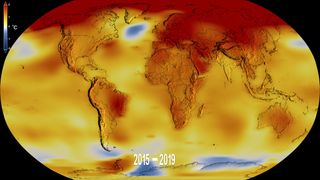2019 was the second hottest year on record, NASA says
It is too hot, and it's our fault.
It's the award no one wanted to win: 2019 was the second hottest year on record, government scientists confirmed yesterday (Jan. 15).
That's according to two separate analyses: one conducted by NASA and one by the National Oceanic and Atmospheric Administration (NOAA). Each study compared 2019 Earth temperature data with scientists' historical records, which begin in 1880. Of those 140 years, only 2016 was warmer than last year; the analyses also show that the five hottest years on record have been the five years beginning in 2015.
"The decade that just ended is clearly the warmest decade on record," Gavin Schmidt, director of NASA's Goddard Institute for Space Studies in New York, said in a statement. "Every decade since the 1960s clearly has been warmer than the one before."
Video: Earth's temperature rise from 2015 to 2019
Related: How NASA Is Using Lasers to Study Climate Change

According to NOAA's temperature report, 2019 was also the 43rd year in a row that saw above-average global land and ocean temperatures. That analysis, like the similar one conducted by NASA, is based on data gathered by more than 20,000 stations around the world.
Temperature increases aren't the only climate upheaval that the federal government's scientists have been tracking. A second NOAA analysis, released on Jan. 8, found that, in the U.S., 2019 was also the second wettest year on record, with only 1973 seeing more precipitation.
The same NOAA report also tallied weather- and climate-related disasters that cost the country $1 billion or more. The U.S. experienced 14 such events in 2019, including wildfires in California, flooding along the Missouri and Mississippi rivers, tornadoes in the south, and tropical storm Imelda in Texas and Hurricane Dorian on the Atlantic coast. Those events add to a decade that saw more such expensive disasters — adjusted for inflation — than the previous decade.
Get the Space.com Newsletter
Breaking space news, the latest updates on rocket launches, skywatching events and more!
The connections between severe-weather events and broader climate changes are complex, but the findings speak to the increasing extremity of weather on Earth. Temperature changes, including average global surface temperature increases, are just one facet of these changes, and the most easily tied to a cause.
"We crossed over into more than 2 degrees Fahrenheit [over 1.1 degrees Celsius] warming territory in 2015 and we are unlikely to go back," Schmidt said in the statement. "This shows that what's happening is persistent, not a fluke due to some weather phenomenon: we know that the long-term trends are being driven by the increasing levels of greenhouse gases in the atmosphere."
- Earth Day 2019: These Amazing NASA Images Show Earth from Above
- Earthrise: 50 Years Ago Today, Apollo 8 Changed Humanity's Vision of Earth Forever
- Climate Change Made Recent Hurricanes Wetter. And They May Get Worse.
Email Meghan Bartels at mbartels@space.com or follow her @meghanbartels. Follow us on Twitter @Spacedotcom and on Facebook.
Join our Space Forums to keep talking space on the latest missions, night sky and more! And if you have a news tip, correction or comment, let us know at: community@space.com.

Meghan is a senior writer at Space.com and has more than five years' experience as a science journalist based in New York City. She joined Space.com in July 2018, with previous writing published in outlets including Newsweek and Audubon. Meghan earned an MA in science journalism from New York University and a BA in classics from Georgetown University, and in her free time she enjoys reading and visiting museums. Follow her on Twitter at @meghanbartels.
-
Truthseeker007 If they only started keeping records since 1880 that is not a very long time for climate. They will push their climate change because they want their carbon taxes so they will keep pushing it until they get it. How about Monsanto or should I call them Bayer plus Monsanto now and the governments should stop Geoengineering the skies all around the world and the climate wouldn't be a whole 2 degrees higher.Reply
